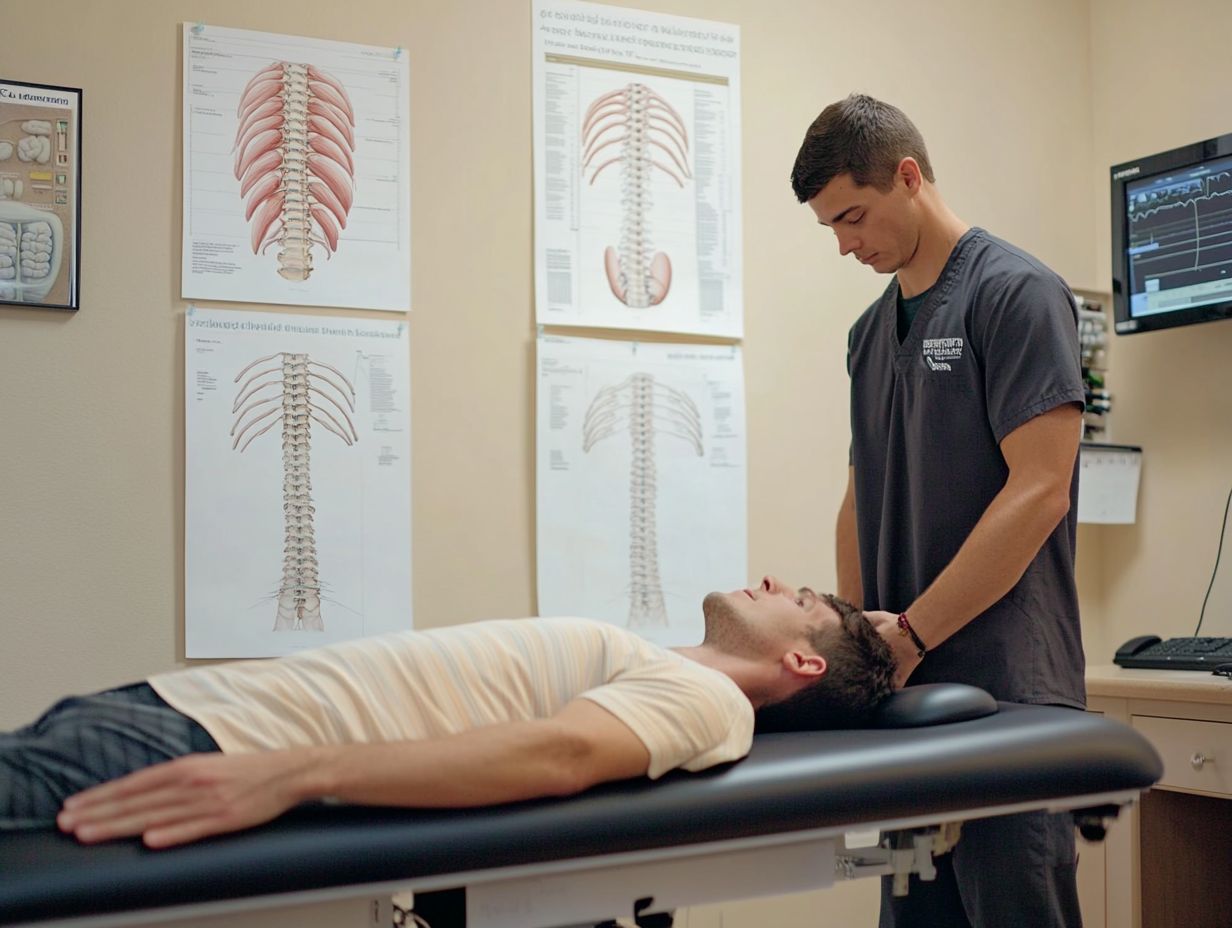The Importance of Regular Spine Check-Ups
The spine is more than just a structural support; it plays a crucial role in our overall health and well-being.
Regular spine check-ups can help prevent chronic conditions, enhance immune function, and improve mobility.
Unfortunately, many people overlook their spinal health, often plagued by misconceptions.
This article explores the significance of routine spine assessments, the benefits they offer, and how a proactive approach can empower you to take control of your health.
Discover how simple check-ups can lead to profound improvements in your quality of life.
Understanding Spinal Health

Understanding spinal health is crucial for acknowledging the significant role that the spine and its components, such as the vertebrae, play in maintaining overall well-being and preventing potential health issues.
A healthy spine not only supports the physical structure of the body but also influences the nervous system, which is essential for coordinating bodily functions and movements.
This interplay impacts various aspects of health, including mobility enhancement, joint health, and pain prevention.
The Role of the Spine in Overall Well-being
The spine serves a crucial function in overall well-being by acting as the central support structure for the body, housing the spinal cord, and facilitating proper nervous system function, which is essential for coordination and mobility. A well-aligned spine not only enhances physical function but also improves posture, thereby influencing lifestyle choices and promoting active participation in daily activities.
When misalignment occurs in the spine, it can result in a series of health issues including chronic pain, decreased mobility, and even emotional distress. Maintaining proper spinal alignment is essential not only for physical health but also for mental clarity and emotional stability.
For example, in a specific case study, a patient experiencing severe lower back pain reported significant improvements in both mobility and mood following a regimen of regular chiropractic adjustments. Patient testimonials further illustrate the transformative effects of chiropractic care, emphasizing that improved spinal alignment can lead to enhanced posture and increased confidence.
With better spinal alignment, individuals frequently experience a reduction in tension and stress, which further contributes to their emotional well-being and overall quality of life.
Common Misconceptions About Spinal Health
Despite the critical importance of spinal health, numerous misconceptions persist that may discourage individuals from pursuing chiropractic care and regular spinal check-ups. These misconceptions often diminish the perceived benefits of preventative care, resulting in the neglect of spinal misalignments that could be effectively addressed through appropriate health maintenance and personalized care strategies tailored to each individual’s needs.
A common myth is the belief that chiropractic care is exclusively focused on alleviating back pain. In truth, chiropractic treatment offers a wide range of health benefits, including improved posture, enhanced athletic performance, and increased overall wellness.
The assumption that only older adults experience spinal issues fails to recognize that individuals of all ages can suffer from symptoms related to poor spinal alignment, which are often exacerbated by contemporary lifestyles characterized by prolonged sitting and extensive use of digital devices.
Therefore, proactive measures such as regular spinal screenings are vital for maintaining optimal health and preventing future ailments—not only for the elderly but for anyone seeking to enhance their quality of life.
Benefits of Regular Spine Check-Ups
Regular spine check-ups provide a wide range of benefits that go beyond simple pain management; they act as a proactive measure for the early detection of chronic conditions and other health concerns, thereby enhancing both spinal health and overall well-being.
Participating in these routine evaluations can result in significant improvements in immune system function, mobility, joint health, and stress management, thereby contributing to a comprehensive approach to wellness.
Preventing Chronic Conditions Through Early Detection

Early detection of spinal health issues through regular examinations is essential for preventing chronic conditions that may result in long-term health complications. By identifying spinal misalignments or dysfunctions at an early stage, practitioners can implement chiropractic adjustments and preventative care strategies, thereby significantly reducing the risk of developing chronic pain and other debilitating conditions.
Conditions such as osteoarthritis and degenerative disc disease, which affect millions of individuals, often arise from undetected spinal problems. Research indicates that early intervention can mitigate the impact of these ailments, reducing the necessity for invasive surgeries by as much as 50%.
By addressing spinal issues before they escalate, many patients can avoid the debilitating pain associated with these disorders. Chiropractic care not only aids in maintaining spinal integrity but also fosters overall health, resulting in improved mobility and quality of life.
With a strategic approach, healthcare professionals can substantially enhance patient outcomes while minimizing the financial and emotional burdens associated with chronic health conditions.
Enhancing Immune System Function
Regular spine check-ups significantly enhance immune system function, as proper spinal alignment promotes optimal communication between the nervous system and the body’s immune responses. Chiropractic care addresses spinal misalignments that may impede this communication, thereby supporting overall health and contributing to holistic wellness.
Numerous studies have documented the substantial connections between spinal health and immune system efficiency. Research has indicated that chiropractic adjustments can reduce stress and inflammation, both of which are known to negatively impact immune function.
When the spine is adequately aligned, the flow of vital information through the nervous system is facilitated, enabling the body to respond more promptly and effectively to pathogens. Furthermore, chiropractic treatments have been associated with increased levels of immune-boosting cells, such as lymphocytes.
This evidence suggests that prioritizing spinal health not only improves physical alignment but also plays a critical role in maintaining a resilient immune system.
Improving Mobility and Posture
One of the most significant advantages of regular spine check-ups is the considerable improvement in mobility and posture, which are crucial for optimal physical performance in both daily activities and athletic endeavors. Chiropractic adjustments facilitate the correction of spinal misalignments that contribute to posture-related issues, resulting in enhanced coordination and diminished discomfort.
Chiropractic care employs a range of techniques, including spinal manipulation and mobilization, to restore proper alignment and function. Through hands-on adjustments, practitioners gently realign the vertebrae, allowing for a more fluid range of motion.
Numerous patients report feeling more agile and balanced following these sessions. A study indicated that 75% of participants experienced noticeable improvements in their mobility after just a few treatments, with many also acknowledging the reduction in back pain that accompanied enhanced posture.
Patient testimonials often highlight improved athletic performance and reduced fatigue throughout the day, illustrating the effectiveness of chiropractic care in promoting a healthier lifestyle.
Supporting Joint Health and Function
Regular spinal check-ups are essential for supporting joint health and function, as they promote proper alignment of the spine, which significantly influences the overall functioning of joints throughout the body. Chiropractic care not only focuses on spinal health but also incorporates strategies for pain prevention and the enhancement of physical function, thereby contributing to a more active lifestyle.
Through targeted spinal adjustments, practitioners can alleviate interference in the nervous system, resulting in improved communication between the brain and joints. This increased awareness not only reduces pain but also enhances the range of motion, allowing individuals to carry out daily activities with greater ease.
Experts have indicated that maintaining spinal alignment can notably decrease wear and tear on various joints, thereby lowering the risk of developing chronic conditions such as arthritis. Case studies have demonstrated that patients often experience significant improvements in mobility after undergoing a series of chiropractic sessions, emphasizing the interconnectedness of spinal health and joint function.
This comprehensive approach fosters healthier, pain-free living and underscores the importance of proactive care in sustaining overall well-being.
Facilitating Better Sleep Patterns

Regular spine check-ups can enhance sleep patterns by addressing underlying spinal health issues that may contribute to discomfort and stress, thereby promoting relaxation and restorative sleep. Chiropractic care aims to optimize spinal alignment, which has been demonstrated to positively influence overall health and stress management.
When the spine is properly aligned, it reduces tension in the nervous system, facilitating improved communication between the body and the brain. This increased efficiency of the nervous system can significantly diminish anxiety and foster a sense of calm, both of which are essential for initiating sleep and maintaining deep sleep cycles.
By alleviating pressure on critical nerves, chiropractic treatments can reduce discomfort that might otherwise interfere with restorative slumber. Incorporating regular chiropractic adjustments, exercises designed to enhance spinal flexibility, and ergonomic assessments into one’s routine can further support this vital connection, ultimately leading to improved sleep quality and overall well-being.
Improved Digestive Health
Improved digestive health is a significant benefit of regular spinal check-ups, given that spinal misalignments can adversely affect the nervous system’s ability to communicate effectively with the digestive organs. Chiropractic care addresses these issues by promoting holistic wellness and encouraging healthier lifestyle choices that contribute to improved digestive function.
Research indicates that misalignment in the spine, particularly in the thoracic and lumbar regions, can lead to gastrointestinal disorders such as acid reflux and irritable bowel syndrome. By realigning the spine, chiropractic adjustments may enhance the functioning of the vagus nerve, which plays a crucial role in digestive processes.
A case study involving patients with chronic acid reflux demonstrated marked improvement in symptoms following a series of chiropractic treatments. This underscores the potential of chiropractic care not only to alleviate musculoskeletal pain but also to promote better digestive health, thereby illustrating the interconnectedness of the body’s systems.
Managing Stress and Mental Well-being
Regular spinal check-ups are essential for effectively managing stress and enhancing mental well-being, as spinal health has a direct influence on the nervous system and its capacity to cope with stressors. Chiropractic care can alleviate bodily tension, leading to improved mental clarity and emotional equilibrium.
Research has indicated that misalignments in the spine can contribute to physical tension, which may exacerbate feelings of anxiety and distress. By realigning the spine through consistent chiropractic sessions, individuals frequently report a noticeable reduction in stress levels and an enhancement in their overall mood.
A study published in the Journal of Chiropractic Medicine highlighted that participants receiving spinal adjustments experienced significant improvements in mental health, underscoring the strong correlation between spinal care and psychological well-being.
To effectively integrate chiropractic care into a stress management routine, individuals may consider the following strategies:
- Scheduling regular appointments
- Practicing mindfulness in conjunction with chiropractic care
- Maintaining a healthy lifestyle that includes adequate nutrition and exercise
These strategies collectively support both spinal health and emotional resilience, fostering a balanced approach to stress management.
Boosting Energy Levels
Regular spinal check-ups are instrumental in enhancing energy levels, as misalignments within the spine can adversely affect overall health and physical performance. Chiropractic care is designed to restore proper alignment, which improves the body’s efficiency in energy utilization, allowing individuals to experience increased energy and activity.
When the spine is correctly aligned, the nervous system operates at its optimal level, which is essential for sustaining high energy levels throughout the day. Numerous individuals have reported significant enhancements in their vitality following chiropractic adjustments.
For example, a recent testimonial from a client underscored how consistent chiropractic sessions improved her overall well-being, enabling her to engage in daily activities without succumbing to fatigue.
Professional insights from chiropractors frequently highlight that spinal health extends beyond pain prevention; it is also crucial for fostering overall wellness and vitality, ultimately contributing to a more active lifestyle.
How Often Should You Get Spine Check-Ups?

The frequency of spine check-ups is largely contingent upon individual health requirements, lifestyle choices, and the recommendations provided by a chiropractor. A chiropractor will customize a health regimen based on the patient’s specific condition and goals. Typically, health professionals recommend regular visits to maintain optimal spinal health and to monitor any changes over time.
For example, younger individuals engaged in active lifestyles may find annual assessments beneficial, while older adults may need more frequent check-ups due to their increased susceptibility to age-related issues, such as degenerative disc disease or osteoporosis. Furthermore, individuals involved in physical labor or high-impact sports should consider regular evaluations to detect potential problems at an early stage. Conversely, those with chronic back pain or pre-existing conditions should prioritize more frequent appointments to effectively manage their symptoms.
Considering these factors promotes a proactive approach to spinal health, allowing for necessary adjustments to the care plan that align with personal needs and overall wellness.
The Holistic Approach to Spine Health
The holistic approach to spine health underscores the importance of integrating chiropractic care with personalized care plans and patient education. This method prioritizes the overall well-being of the individual, rather than merely addressing isolated symptoms.
The comprehensive strategy seeks to identify and address the underlying causes of spinal dysfunction while promoting a healthy lifestyle, thereby actively involving patients in their health journey.
Customized Care Plans for Individual Needs
Customized care plans tailored to individual needs are fundamental to effective chiropractic care, enabling practitioners to design interventions that specifically address the unique spinal health requirements of each patient. These individualized care strategies enhance overall well-being by taking into account various factors such as lifestyle, health status, and personal goals.
For example, a younger athlete may require a care plan that focuses on improving flexibility and preventing injuries, while an older adult may benefit more from a plan that emphasizes pain management and enhancing mobility. By thoroughly assessing these distinct needs, chiropractors can implement targeted treatments that include specific adjustment techniques, rehabilitative exercises, and lifestyle counseling.
As a result, patients may experience improved athletic performance or enhanced daily functioning, illustrating the significant impact of personalized chiropractic interventions. Ultimately, such customized approaches not only foster patient trust and satisfaction but also contribute to more successful health outcomes that are tailored to the diverse profiles present within a chiropractic practice.
Importance of Patient Education
Patient education plays a crucial role in chiropractic care by give the power toing individuals to take responsibility for their spinal health and make informed lifestyle choices that support health maintenance. By comprehending the significance of spinal health, patients are encouraged to engage more actively in their treatment plans and overall wellness journey.
Educational sessions typically address essential topics, including proper posture, ergonomic practices, and the impact of physical activity on spinal integrity. When individuals gain insight into how their daily habits affect their spine, they become better equipped to implement changes that promote long-term health.
Additionally, understanding the role of nutrition and hydration in muscle and joint function can enhance the efficacy of chiropractic adjustments.
This knowledge fosters a collaborative relationship between the patient and chiropractor, facilitating the development of tailored care plans that optimize recovery and preventive strategies. Ultimately, this collaboration leads to improved health outcomes.
Empowering Yourself Through Regular Check-Ups
Empowering oneself through regular check-ups is essential for maintaining spinal health and overall wellness, as these evaluations provide crucial insights into health status and facilitate well-considered choices regarding care. By actively participating in this process, individuals can make significant progress toward achieving better health outcomes and a more fulfilling life.
Maintaining a proactive approach to check-ups also enables early detection of potential issues, allowing for timely interventions that can prevent the development of more serious conditions in the future. To incorporate this practice into one’s routine, consider scheduling appointments at the beginning of each year or setting reminders on a mobile device to ensure adherence to a consistent schedule.
Establishing an open dialogue with healthcare providers regarding any concerns can further enhance one’s understanding of their health journey. Additionally, it is important to prioritize mental wellness, as it plays an integral role in physical well-being, thus fostering a holistic approach to health.
